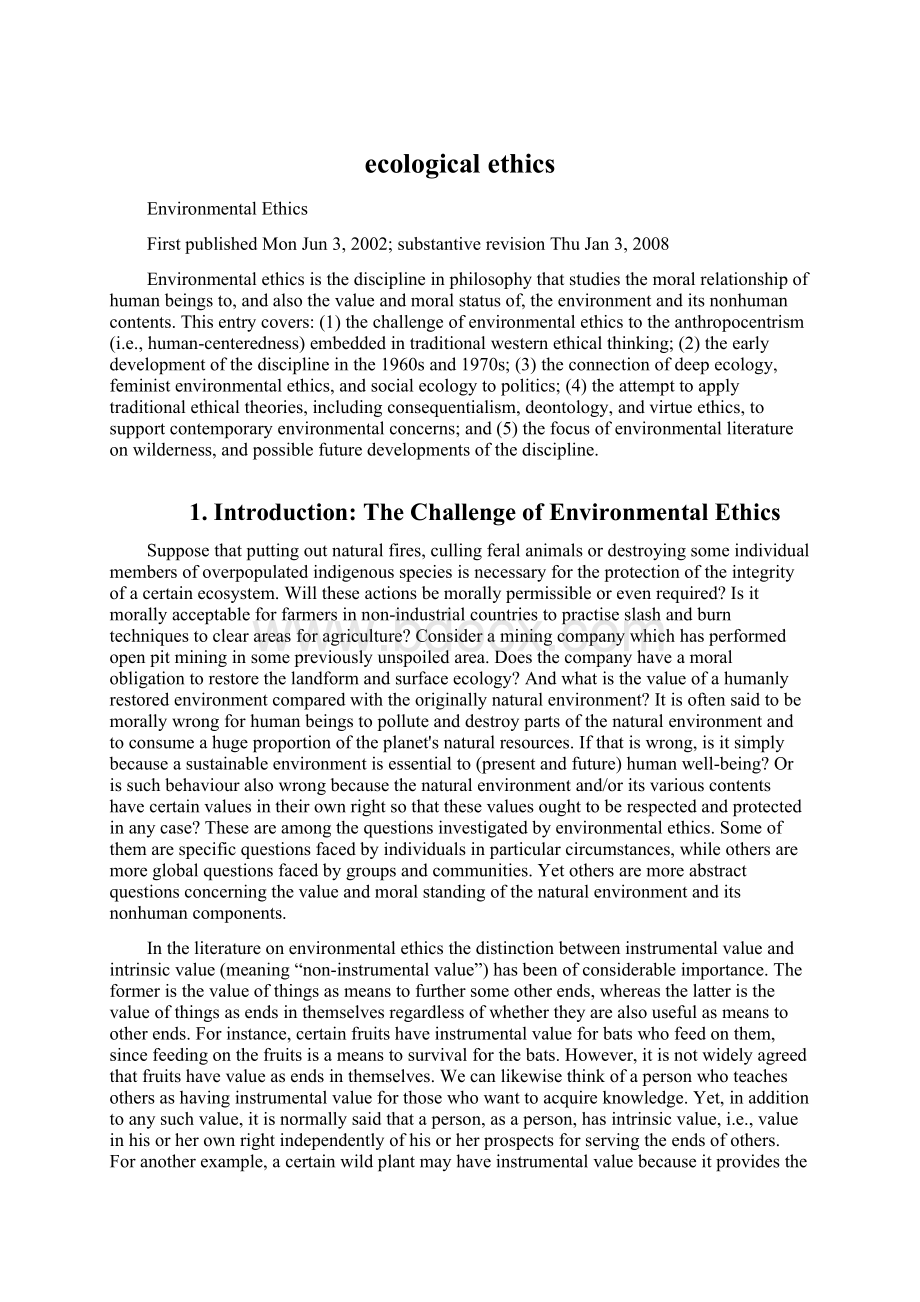ecological ethics.docx
《ecological ethics.docx》由会员分享,可在线阅读,更多相关《ecological ethics.docx(22页珍藏版)》请在冰豆网上搜索。

ecologicalethics
EnvironmentalEthics
FirstpublishedMonJun3,2002;substantiverevisionThuJan3,2008
Environmentalethicsisthedisciplineinphilosophythatstudiesthemoralrelationshipofhumanbeingsto,andalsothevalueandmoralstatusof,theenvironmentanditsnonhumancontents.Thisentrycovers:
(1)thechallengeofenvironmentalethicstotheanthropocentrism(i.e.,human-centeredness)embeddedintraditionalwesternethicalthinking;
(2)theearlydevelopmentofthedisciplineinthe1960sand1970s;(3)theconnectionofdeepecology,feministenvironmentalethics,andsocialecologytopolitics;(4)theattempttoapplytraditionalethicaltheories,includingconsequentialism,deontology,andvirtueethics,tosupportcontemporaryenvironmentalconcerns;and(5)thefocusofenvironmentalliteratureonwilderness,andpossiblefuturedevelopmentsofthediscipline.
1.Introduction:
TheChallengeofEnvironmentalEthics
Supposethatputtingoutnaturalfires,cullingferalanimalsordestroyingsomeindividualmembersofoverpopulatedindigenousspeciesisnecessaryfortheprotectionoftheintegrityofacertainecosystem.Willtheseactionsbemorallypermissibleorevenrequired?
Isitmorallyacceptableforfarmersinnon-industrialcountriestopractiseslashandburntechniquestoclearareasforagriculture?
Consideraminingcompanywhichhasperformedopenpitmininginsomepreviouslyunspoiledarea.Doesthecompanyhaveamoralobligationtorestorethelandformandsurfaceecology?
Andwhatisthevalueofahumanlyrestoredenvironmentcomparedwiththeoriginallynaturalenvironment?
Itisoftensaidtobemorallywrongforhumanbeingstopolluteanddestroypartsofthenaturalenvironmentandtoconsumeahugeproportionoftheplanet'snaturalresources.Ifthatiswrong,isitsimplybecauseasustainableenvironmentisessentialto(presentandfuture)humanwell-being?
Orissuchbehaviouralsowrongbecausethenaturalenvironmentand/oritsvariouscontentshavecertainvaluesintheirownrightsothatthesevaluesoughttoberespectedandprotectedinanycase?
Theseareamongthequestionsinvestigatedbyenvironmentalethics.Someofthemarespecificquestionsfacedbyindividualsinparticularcircumstances,whileothersaremoreglobalquestionsfacedbygroupsandcommunities.Yetothersaremoreabstractquestionsconcerningthevalueandmoralstandingofthenaturalenvironmentanditsnonhumancomponents.
Intheliteratureonenvironmentalethicsthedistinctionbetweeninstrumentalvalueandintrinsicvalue(meaning“non-instrumentalvalue”)hasbeenofconsiderableimportance.Theformeristhevalueofthingsasmeanstofurthersomeotherends,whereasthelatteristhevalueofthingsasendsinthemselvesregardlessofwhethertheyarealsousefulasmeanstootherends.Forinstance,certainfruitshaveinstrumentalvalueforbatswhofeedonthem,sincefeedingonthefruitsisameanstosurvivalforthebats.However,itisnotwidelyagreedthatfruitshavevalueasendsinthemselves.Wecanlikewisethinkofapersonwhoteachesothersashavinginstrumentalvalueforthosewhowanttoacquireknowledge.Yet,inadditiontoanysuchvalue,itisnormallysaidthataperson,asaperson,hasintrinsicvalue,i.e.,valueinhisorherownrightindependentlyofhisorherprospectsforservingtheendsofothers.Foranotherexample,acertainwildplantmayhaveinstrumentalvaluebecauseitprovidestheingredientsforsomemedicineorasanaestheticobjectforhumanobservers.Butiftheplantalsohassomevalueinitselfindependentlyofitsprospectsforfurtheringsomeotherendssuchashumanhealth,orthepleasurefromaestheticexperience,thentheplantalsohasintrinsicvalue.Becausetheintrinsicallyvaluableisthatwhichisgoodasanendinitself,itiscommonlyagreedthatsomething'spossessionofintrinsicvaluegeneratesaprimafaciedirectmoraldutyonthepartofmoralagentstoprotectitoratleastrefrainfromdamagingit(seeO'Neil1992andJameson2002fordetailedaccountsofintrinsicvalue).
Manytraditionalwesternethicalperspectives,however,areanthropocentricorhuman-centeredinthateithertheyassignintrinsicvaluetohumanbeingsalone(i.e.,whatwemightcallanthropocentricinastrongsense)ortheyassignasignificantlygreateramountofintrinsicvaluetohumanbeingsthantoanynonhumanthingssuchthattheprotectionorpromotionofhumaninterestsorwell-beingattheexpenseofnonhumanthingsturnsouttobenearlyalwaysjustified(i.e.,whatwemightcallanthropocentricinaweaksense).Forexample,Aristotle(Politics,Bk.1,Ch.8)maintainsthat“naturehasmadeallthingsspecificallyforthesakeofman”andthatthevalueofnonhumanthingsinnatureismerelyinstrumental.Generally,anthropocentricpositionsfinditproblematictoarticulatewhatiswrongwiththecrueltreatmentofnonhumananimals,excepttotheextentthatsuchtreatmentmayleadtobadconsequencesforhumanbeings.ImmanuelKant(“DutiestoAnimalsandSpirits”,inLecturesonEthics),forinstance,suggeststhatcrueltytowardsadogmightencourageapersontodevelopacharacterwhichwouldbedesensitizedtocrueltytowardshumans.Fromthisstandpoint,crueltytowardsnonhumananimalswouldbeinstrumentally,ratherthanintrinsically,wrong.Likewise,anthropocentrismoftenrecognizessomenon-intrinsicwrongnessofanthropogenic(i.e.human-caused)environmentaldevastation.Suchdestructionmightdamagethewell-beingofhumanbeingsnowandinthefuture,sinceourwell-beingisessentiallydependentonasustainableenvironment(seePassmore1974,Bookchin1990,Norton,Hutchins,Stevens,andMaple(eds.)1995).
Whenenvironmentalethicsemergedasanewsub-disciplineofphilosophyintheearly1970s,itdidsobyposingachallengetotraditionalanthropocentrism.Inthefirstplace,itquestionedtheassumedmoralsuperiorityofhumanbeingstomembersofotherspeciesonearth.Inthesecondplace,itinvestigatedthepossibilityofrationalargumentsforassigningintrinsicvaluetothenaturalenvironmentanditsnonhumancontents.
Itshouldbenoted,however,thatsometheoristsworkinginthefieldseenoneedtodevelopnew,non-anthropocentrictheories.Instead,theyadvocatewhatmaybecalledenlightenedanthropocentrism(or,perhapsmoreappropriatelycalled,prudentialanthropocentrism).Briefly,thisistheviewthatallthemoraldutieswehavetowardstheenvironmentarederivedfromourdirectdutiestoitshumaninhabitants.Thepracticalpurposeofenvironmentalethics,theymaintain,istoprovidemoralgroundsforsocialpoliciesaimedatprotectingtheearth'senvironmentandremedyingenvironmentaldegradation.Enlightenedanthropocentrism,theyargue,issufficientforthatpracticalpurpose,andperhapsevenmoreeffectiveindeliveringpragmaticoutcomes,intermsofpolicy-making,thannon-anthropocentrictheoriesgiventhetheoreticalburdenonthelattertoprovidesoundargumentsforitsmoreradicalviewthatthenonhumanenvironmenthasintrinsicvalue(cf.Norton1991,deShalit1994,LightandKatz1996).Furthermore,someprudentialanthropocentristsmayholdwhatmightbecalledcynicalanthropocentrism,whichsaysthatwehaveahigher-levelanthropocentricreasontobenon-anthropocentricinourday-to-daythinking.Supposethataday-to-daynon-anthropocentristtendstoactmorebenignlytowardsthenonhumanenvironmentonwhichhumanwell-beingdepends.Thiswouldprovidereasonforencouragingnon-anthropocentricthinking,eventothosewhofindtheideaofnon-anthropocentricintrinsicvaluehardtoswallow.Inorderforsuchastrategytobeeffectiveonemayneedtohideone'scynicalanthropocentrismfromothersandevenfromoneself.
2.TheEarlyDevelopmentofEnvironmentalEthics
Althoughnaturewasthefocusofmuchnineteenthandtwentiethcenturyphilosophy,contemporaryenvironmentalethicsonlyemergedasanacademicdisciplineinthe1970s.Thequestioningandrethinkingoftherelationshipofhumanbeingswiththenaturalenvironmentoverthelastthirtyyearsreflectedanalreadywidespreadperceptioninthe1960sthatthelatetwentiethcenturyfaceda“populationtimebomb”andaseriousenvironmentalcrisis.AmongtheaccessibleworkthatdrewattentiontoasenseofcrisiswasRachelCarson'sSilentSpring(1963),whichconsistedofanumberofessaysearlierpublishedintheNewYorkermagazinedetailinghowpesticidessuchasDDT,aldrinanddeildrinconcentratedthroughthefoodweb.Commercialfarmingpracticesaimedatmaximizingcropyieldsandprofits,Carsonspeculates,arecapableofimpactingsimultaneouslyonenvironmentalandpublichealth.
Ontheotherhand,historianLynnWhitejr.,inamuch-citedessaypublishedin1967(White1967)onthehistoricalrootsoftheenvironmentalcrisis,arguesthatthemainstrandsofJudeo-Christianthinkinghadencouragedtheoverexploitationofnaturebymaintainingthesuperiorityofhumansoverallotherformsoflifeonearth,andbydepictingallofnatureascreatedfortheuseofhumans.White'sthesisiswidelydiscussedintheology,history,andhasbeensubjecttosomesociologicaltestingaswellasbeingregularlydiscussedbyphilosophers(seeWhitney1993,Attfield2001).CentraltotherationaleforhisthesisweretheworksoftheChurchFathersandTheBibleitself,supportingtheanthropocentricperspectivethathumansaretheonlythingsthatmatteronEarth.Consequently,theymayutilizeandconsumeeverythingelsetotheiradvantagewithoutanyinjustice.Forexample,Genesis1:
27-8states:
“Godcreatedmaninhisownimage,intheimageofGodcreatedhehim;maleandfemalecreatedhethem.AndGodblessedthem,andGodsaiduntothem,